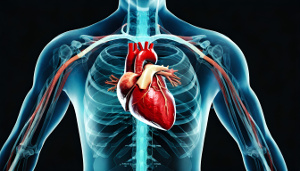Vitamin B12 in breastmilk supports child growth and brain development
 Fetuses and children need various nutrients, including vitamin B12, to support the development of the body and brain. According to a study published in The American Journal of Clinical Nutrition, it is crucial to breastfeed the child for a period of at least six months to make sure it gets enough vitamin B12 from the mother’s milk. Most people get enough B12 from animal food sources. However, in countries and populations where people primarily consume plant-based diets, vitamin B12 deficiencies are common. The scientists behind the new study therefore recommend more focus on this specific area and recommend that pregnant and breastfeeding women take vitamin B12 as a supplement in case they don’t get enough from their diet.
Fetuses and children need various nutrients, including vitamin B12, to support the development of the body and brain. According to a study published in The American Journal of Clinical Nutrition, it is crucial to breastfeed the child for a period of at least six months to make sure it gets enough vitamin B12 from the mother’s milk. Most people get enough B12 from animal food sources. However, in countries and populations where people primarily consume plant-based diets, vitamin B12 deficiencies are common. The scientists behind the new study therefore recommend more focus on this specific area and recommend that pregnant and breastfeeding women take vitamin B12 as a supplement in case they don’t get enough from their diet.
Read more about how vitamin B12 in breastmilk supports child growth and brain development
- Created on .












 The number of older people is increasing rapidly, which means more and more people suffer from different types of dementia.
The number of older people is increasing rapidly, which means more and more people suffer from different types of dementia. 
 Cholesterol is an essential compound with many different functions. However, it can also turn into a potentially dangerous substance if it oxidizes and is embedded in the blood vessel walls. This oxidative process is what eventually leads to atherosclerosis. The trace element selenium protects against atherosclerosis because of its antioxidant properties and because of other mechanisms, according to a review article published in Biomedicine. This is highly relevant in our part of the world where cardiovascular disease is the leading cause of death, and where
Cholesterol is an essential compound with many different functions. However, it can also turn into a potentially dangerous substance if it oxidizes and is embedded in the blood vessel walls. This oxidative process is what eventually leads to atherosclerosis. The trace element selenium protects against atherosclerosis because of its antioxidant properties and because of other mechanisms, according to a review article published in Biomedicine. This is highly relevant in our part of the world where cardiovascular disease is the leading cause of death, and where  Migraine headaches, a problem that affects far more women than men, is one of the diseases that costs most sick days, and there is no medical treatment that can cure the underlying cause. What we eat appears to play a major role, which is because foods such as matured cheese, chocolate, caffeinated beverages, red wine, and monosodium glutamate (MSG) can trigger migraines and headaches. Also, eating an unbalanced diet that is low in specific nutrients such as magnesium, B vitamins, and Q10 can disrupt certain metabolic processes, thereby setting off an attack. This was seen in a new study that is published in Frontiers in Nutrition.
Migraine headaches, a problem that affects far more women than men, is one of the diseases that costs most sick days, and there is no medical treatment that can cure the underlying cause. What we eat appears to play a major role, which is because foods such as matured cheese, chocolate, caffeinated beverages, red wine, and monosodium glutamate (MSG) can trigger migraines and headaches. Also, eating an unbalanced diet that is low in specific nutrients such as magnesium, B vitamins, and Q10 can disrupt certain metabolic processes, thereby setting off an attack. This was seen in a new study that is published in Frontiers in Nutrition.



 Non-alcoholic fatty liver disease (NAFLD) that is linked to overweight and type 2 diabetes may eventually cause critical liver inflammation, liver fibrosis, and liver cancer. The diet plays a major role, and scientists from Oregon State University have observed that the
Non-alcoholic fatty liver disease (NAFLD) that is linked to overweight and type 2 diabetes may eventually cause critical liver inflammation, liver fibrosis, and liver cancer. The diet plays a major role, and scientists from Oregon State University have observed that the 
 "After about one week of taking the Q10 supplement I could feel a huge difference," says 23-year old Alan Piccini, who has been suffering from extreme fatigue and muscle aches ever since he was a child.
"After about one week of taking the Q10 supplement I could feel a huge difference," says 23-year old Alan Piccini, who has been suffering from extreme fatigue and muscle aches ever since he was a child. “Taking capsules with co-enzyme Q10 has freed me of the severe side effects of my cholesterol lowering medicine,” Mrs Franken explains.
“Taking capsules with co-enzyme Q10 has freed me of the severe side effects of my cholesterol lowering medicine,” Mrs Franken explains.